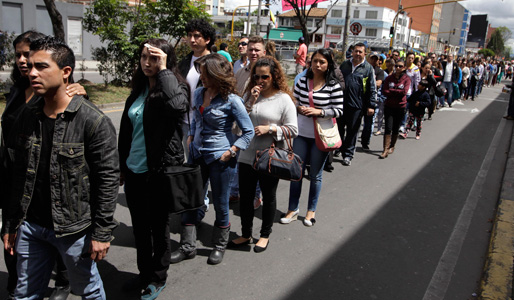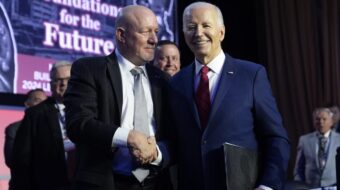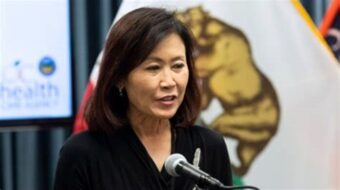
Second round presidential voting took place in Colombia on June 15.
It’s evident a week after President Juan Manuel Santos won re-election with 51 percent of the vote that his government’s peace negotiations with the Revolutionary Armed Forces of Colombia (FARC), in progress for 18 months, will be continuing. Santos defeated Democratic Center Party candidate Óscar Iván Zuluaga who gained 47 percent of the vote. Both candidates are ultra-conservative with the future of the talks the only issue dividing them.
Zuluaga, widely regarded as a protégée of ex-President Alvaro Uribe, identified with the Uribe position of not giving up on military victory over the FARC. May 2014 marked the insurgency’s 50th year of fighting first for control of land and later on behalf also of democratic participation and social justice. The Uribe wing of Colombian conservatism, led for generations by big landowners and military chieftains, has long been at odds with urban-based counterparts championed by President Santos, financiers or businesspersons with global linkages.
Santos’ victory hardly guarantees a mandate for long-term peace with social justice. As ex-President Uribe’s defense minister, Santos had ultimate responsibility for army killings of civilians passed off as FARC casualties and for deadly, U.S. assisted bombings of FARC installations. And the constellation of electoral forces involved with his victory hints at precarious support for peace in the future.
Santos prevailed because much of the electorate backing a leftist electoral coalition in first-round voting opted for him on June 15. On May 25 they had voted for Clara Lopez, presidential candidate of the social democratic Alternative Democratic Pole and for Aida Abello, vice presidential candidate of the Patriotic Union. The Communist Party had taken the lead in reviving the latter party. Vowing to remain in the opposition, leaders of that coalition rejected Santos’ offer to enter his new government.
The Uribe-Zuluaga campaign emerged from the election in a position of strength. Its bloc of 7 million voters responding to a disciplined party won in 612 0f 1,100 municipalities and now controls municipal governments and claims 21 senators. Earlier voting had placed Uribe himself in the Senate where as head of the Democratic Center opposition bench he’ll be able to block agrarian reform measures and citizen security sought by FARC peace negotiators in Havana.
Election results gave rise to new uncertainty in the form of massive voter abstention. In May 60 percent of eligible voters stayed away and six percent of counted ballots were blank. Zuluaga won 29 percent of votes cast then and bested Santos by three percentage points. Voter abstention on June 15 was 52 percent. There is the good possibility that abstainers distrust both candidates for their history of U.S. assisted war making and the Uribe camp for its association with paramilitary violence. How abstainers will react to terms of a future peace settlement is unclear.
Left-leaning observer José Antonio Gutiérrez, writing on rebelion.org, finds little to celebrate. The Santos campaign was victorious in large part, he suggests, because of efficient vote gathering machinery. Votes were bought, he indicates, in districts along the Caribbean coast. He thinks the Colombian left emerged from the elections in a weakened state for having burnished Santos’ image. Importantly, they may be unable to deliver effective support for any peace settlement that includes structural changes. Henceforth talks may be focusing mainly on the politically feasible.
Another observer opines that Santos gained a new legitimacy to realize peace on terms suiting his constituency. Prospects have waned for an early end to armed conflict and for diverting resources from armed conflict to pressing social needs. Any notion that entitled Colombians would make “great sacrifices” for the sake of peace has disappeared.
Not all news is bad for peacemakers. Leaders of the Army of National Liberation (ELN), Colombia’s other insurgency, channeled an announcement through peace activist Piedad Cordoba indicating that the government and ELN had entered into an exploratory phase of talks leading to eventual peace negotiations. Cordoba publicized the news on June 10. Despite the many retired army officers who follow ex-President Uribe’s lead, Army head General Jaime Alfonso Lasprilla, speaking to special forces trainees on June 21, characterized the Army’s support for the peace process in Havana as unconditional.
And negotiations are advancing. Early in June FARC negotiators agreed to add the FARC’s victims to the discussion point on victims. And government counterparts accepted the FARC’s demand that a “commission of [historical] clarification” be created in advance of any truth commission that is part of a peace settlement. This meeting of minds makes it possible for the agenda item on victims to be taken up. For FARC negotiator Pablo Catatumbo, reparation of victims is a “first step toward reconciliation.”
In his interview with El Espectador, Catatumbo asked that Santos “distance himself from everything Uribe represents and opt for social justice and change, [also that he] open his eyes to a diverse political spectrum.”
Photo: Voters line up at a polling station during presidential elections in Bogota, Colombia, June 15. Javier Galeano/AP












Comments